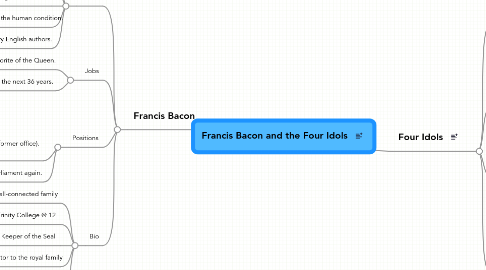
1. Francis Bacon
1.1. Works
1.1.1. Writing style-very grandiose with elaborate words
1.1.2. His writing represented a perfect model of plain language and transparent meaning.
1.1.3. Published Novum Organum in 1620
1.1.4. proposed an entirely new system based on empirical and inductive principles and the active development of new arts and inventions, a system whose ultimate goal would be the production of practical knowledge for “the use and benefit of men” and the relief of the human condition.
1.1.5. if Bacon had produced nothing else but his masterful Essayes (first published in 1597 and then revised and expanded in 1612 and 1625), he would still rate among the top echelon of 17th-century English authors.
1.2. Jobs
1.2.1. 1596 Bacon entered the service of Robert Devereux, the Earl of Essex, a dashing courtier, soldier, plotter of intrigue, and sometime favorite of the Queen.
1.2.1.1. Essex’s own fortunes plummeted following a series of military and political blunders and Bacon fell along with him.
1.2.2. Elected to Parliament in 1584 as a member for Melcombe in Dorsetshire. He represented various constituencies for the next 36 years.
1.3. Positions
1.3.1. 1604 – Appointed King’s Counsel. 1607 – Named Solicitor General. 1608 – Appointed Clerk of the Star Chamber. 1613 – Appointed Attorney General. 1616 – Made a member of the Privy Council. 1617 – Appointed Lord Keeper of the Royal Seal (his father’s former office). 1618 – Made Lord Chancellor.
1.3.2. 1621 he was arrested and charged with bribery. He was never allowed to hold office in parliament again.
1.4. Bio
1.4.1. Born Jan. 22, 1561 into a well-connected family
1.4.2. Entered Trinity College @ 12
1.4.2.1. Lifelong opposition to aristotelianism, but not to the works of Aristotle
1.4.3. Father- Sir Nicolas Bacon the Lord Keeper of the Seal
1.4.4. Mother- Lady Anne Cooke, daughter of Sir Anthony Cooke, a knight and one-time tutor to the royal family
1.4.5. Died on 9 April, 1626, supposedly of a cold or pneumonia contracted while testing his theory of the preservative and insulating properties of snow.
2. Four Idols
2.1. Idols of the tribe
2.1.1. Our senses
2.1.1.1. Our senses are inherently dull and decievable
2.1.1.2. Requires instruments and strict methods to overcome
2.1.2. Our tendency to discern more order than is actually there, "oversimplification"
2.1.2.1. Finding similarities when there is actually randomness
2.1.3. our tendency towards wishful thinking
2.1.3.1. Tendency to see what we want to see
2.1.4. our tendency to rush to wishful conclusions and make premature judgements
2.2. Idols of the cave
2.2.1. Special alliegence to a specific discipline or theory
2.2.2. high esteem to a few select authorities
2.2.3. A cookie-cutter mentality
2.2.3.1. Tendency to constrain phenomena within one's area of expertise
2.3. Idols of the marketplace
2.3.1. Fallacy of language
2.3.1.1. Misleading names of things that do exist
2.3.1.1.1. Abstract terms and subjective values such as "moist" and "useful"
2.3.1.2. Names of things that do not exist
2.3.1.2.1. Aristotle's Crystalline spheres
2.3.1.2.2. the deity Fortune
2.3.1.3. words that group dissimilar things together and similar things apart
2.4. Idols of the theater
2.4.1. Sophistical philosophy
2.4.1.1. Based on a few casual observed instances
2.4.1.2. Arguments constructed mainly from abstract arguments
2.4.2. Empirical philosophy
2.4.2.1. Based on a single key insight which is then expanded to explain an overly wide variety of phenomena
2.4.2.2. Narrow base of research
2.4.3. Superstitious philosophy
2.4.3.1. Mixes theology and philosophy
2.4.3.1.1. Pythagoras and Plato, Creationists
